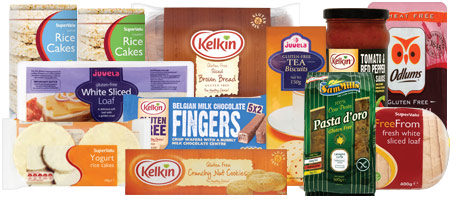Coeliac Disease
What is Coeliac disease and what can you eat if you have a gluten intolerance?
Coeliac disease is a condition where someone has a sensitivity to gluten, the protein found in wheat, rye and barley.
If someone is sensitive to gluten, the gluten can damage the lining of the small bowel and make it harder for the body to absorb food and nutrients. There are a lot of people with coeliac disease in Ireland – about 1 in every 100 people are coeliac and you can be diagnosed at any age – from childhood to old-age.
Why is Coeliac Disease a problem?
The big problem with coeliac disease is that food and nutrients are not absorbed as normal. This means that food can pass on through the small bowel and into the large bowel leading to problems such as diarrhoea, cramps and bloating. However, not everyone who is coeliac will have the same symptoms – some people have constipation or some have a range of symptoms that are often confused with irritable bowel syndrome. The other problem is that people can become low in certain vitamins and minerals if their body does not absorb them as it should. People with coeliac disease are often low in iron, calcium and B vitamins.
What is the treatment for Coeliac Disease?
The only treatment for coeliac disease is to completely avoid foods containing gluten. Gluten is a protein found in wheat, rye and barley. Some people may also be sensitive to the protein found in oats. There are no medications or other treatments that will work and gluten needs to be avoided for life – not just until people feel better.
Avoiding gluten may not be as easy as it sounds. A large number of foods in Ireland are made with wheat – bread, cakes, biscuits, pastry, pizza and crackers, to name just a few. Gluten also turns up in a lot of manufactured foods for example in sauces, sweets, chocolate, stock cubes and processed meats such as sausages. It is important to get good advice about diet from a qualified Dietitian as soon as someone is diagnosed. The INDI have a list of qualified dietitians on their website (www.indi.ie). People need advice about foods to avoid but also about some of the nutritional problems coeliacs can run into, especially problems with lack of fibre, calcium and iron.
It is important to remember that reading food labels is not enough when it comes to deciding if a food is gluten free or not. The Coeliac Society (www.coeliac.ie) produces the manufacturers food list every year. This list contains all of the manufactured foods that are gluten free. This list is invaluable when you are going shopping but it does need to be updated every year as manufacturers do change recipes. A brief look at some foods to avoid and some to choose is below but do remember to get some good professional advice on how to manage your gluten free diet.
Foods to avoid
This is not a complete list, check with your dietitian for full details
Bread, cakes, biscuits, pastries, crackers.
Pasta, noodles, cous cous, tortillas, pita bread.
Wheat flour, rye flour, spelt flour, kamut, bulgar wheat, semolina, oat flour.
Meat, fish or poultry pies*, meat, poultry or fish in sauces or in ready meals*.
Fruit or vegetables in pies, sauces and desserts*.
Yoghurt with added cereals, Crisps*, tortilla chips*, salted snacks*.
Malt, malt extract, lemon curd.
Barley water, beer, stout, ale.
Foods to choose
This is not a complete list, check with your dietitian for full details
Gluten free bread, gluten free biscuits & cakes, gluten free crackers, gluten free pasta, rice.
Rice flour, potato flour, buckwheat, quinoa, corn flour/corn starch, tapioca, millet, polenta.
All fresh, frozen or smoked meat, chicken, fish or shellfish, eggs, dried peas, beans or lentils.
All fresh, fozen or tinned fruit, vegetables or salads.
Milk, natural yoghurt, natural cheese, cream, butter.
Plain nuts and seeds, homemade popcorn (made from plain kernels).
Fresh herbs and plain spices, pure oils & fats (e.g. olive oil, rapeseed oil), jam, marmalade.
Tea, coffee, herbal teas, wine, spirits, port, cider.
*Check the Manufacturers food list as some gluten free varieties may be available.
